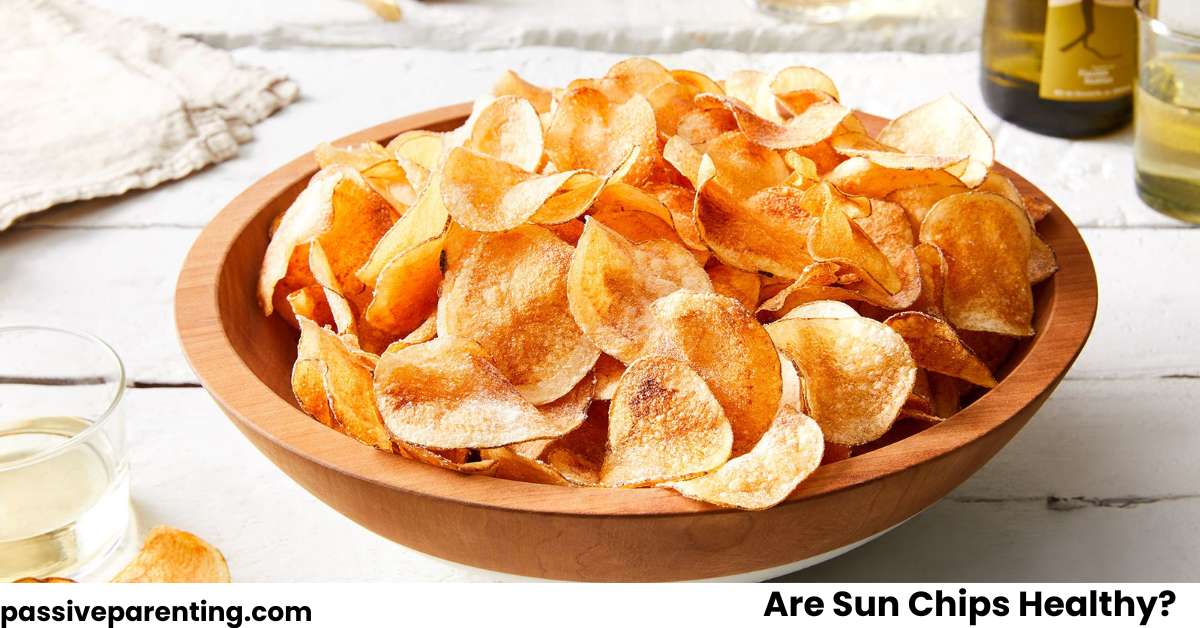Sun Chips have carved out a unique place in the snack aisle. Marketed as a “wholesome” alternative to greasy potato chips, these multigrain crisps promise crunch with a healthier twist. But marketing and nutrition don’t always tell the same story.
If you’ve ever asked yourself are Sun Chips healthy?, you’re not alone. Let’s take a closer look at their nutrition, ingredients, benefits, and drawbacks and see how they compare to other popular snacks.
What Exactly Are Sun Chips?
Sun Chips are a brand of multigrain chips introduced by Frito-Lay in 1991. Unlike traditional potato chips, they are made with a blend of whole corn, wheat, rice, and oats, giving them their signature woven texture and hearty crunch.
Popular flavors include:
- Original
- Harvest Cheddar
- Garden Salsa
- French Onion
Each variety has a similar base but slightly different seasonings, sodium levels, and added ingredients.
Sun Chips Nutrition Facts
The nutritional profile depends on flavor, but here’s an average per 1-ounce serving (about 15 chips) of Original Sun Chips:
| Nutrient | Amount per 1 oz (28 g) serving |
|---|---|
| Calories | 140 |
| Total Fat | 6 g |
| Saturated Fat | 1 g |
| Carbohydrates | 19 g |
| Dietary Fiber | 2 g |
| Protein | 2 g |
| Sodium | 120 mg |
Comparison: Sun Chips vs Regular Potato Chips
| Snack (1 oz) | Calories | Fat | Saturated Fat | Fiber | Sodium |
|---|---|---|---|---|---|
| Sun Chips Original | 140 | 6 g | 1 g | 2 g | 120 mg |
| Lay’s Classic Potato Chips | 160 | 10 g | 1.5 g | 1 g | 170 mg |
Observation: Sun Chips have slightly fewer calories and fat, and more fiber, than regular potato chips. Still, both are processed snack foods.
Are Sun Chips Healthier Than Regular Chips?
Marketing often highlights Sun Chips as the “better choice.” Compared with traditional chips, they do have some advantages:
Pros
- Whole grains: Provide more fiber and nutrients than refined potatoes.
- Less fat: About 40% less fat than some fried chips.
- More texture and satiety: The crunch and fiber can help you feel full faster.
Cons
- Still processed: They are flavored, seasoned, and packaged like other snack foods.
- Sodium: A serving may have 120–210 mg sodium depending on flavor, and eating multiple servings adds up quickly.
- Calories add up: Portion sizes are easy to overeat, turning a 140-calorie snack into 400+ calories.
According to the Cleveland Clinic, processed snacks, even with whole grains, should be eaten in moderation because they often contain added salt and flavorings.
Health Benefits of Sun Chips in Moderation
Sun Chips aren’t a superfood, but they do offer a few positives compared to other chips:
1. Whole Grain Content
Whole grains provide dietary fiber, which supports digestion and may lower the risk of heart disease. Studies emphasize that whole grains are linked to reduced risk of type 2 diabetes and cardiovascular disease.
2. Lower Saturated Fat
With only 1 gram of saturated fat per serving, Sun Chips contribute less to cholesterol concerns compared to snacks high in butter or trans fats.
3. Slightly Better Nutrient Profile
Because of the multigrain base, Sun Chips provide small amounts of B vitamins and minerals not typically found in plain potato chips.
Downsides of Eating Sun Chips
While Sun Chips are marketed as healthier, they still have downsides:
1. Sodium Concerns
High sodium intake is linked to hypertension. Flavored Sun Chips (like Harvest Cheddar) contain over 200 mg sodium per serving, which adds up quickly. The American Heart Association recommends limiting sodium to 1,500–2,300 mg per day.
2. Processed Ingredients
Despite the “whole grain” label, Sun Chips still include vegetable oils, flavorings, and additives.
3. Easy to Overeat
Sun Chips are crunchy and tasty which makes stopping at one serving difficult. Overeating negates any health advantages.
Which Sun Chips Flavor Is the Healthiest?
Not all Sun Chips are created equal. Here’s a quick comparison:
- Original: Lowest sodium (120 mg), simplest ingredient list — best choice overall.
- Harvest Cheddar: Higher sodium (~210 mg) and added cheese flavor.
- Garden Salsa: Spicy flavoring, sodium ~200 mg.
- French Onion: Also ~200 mg sodium, with onion/garlic seasoning.
Verdict: If you want the “healthiest” option, stick to Original Sun Chips for fewer additives and less sodium.
How Often Can You Eat Sun Chips?
Enjoying Sun Chips occasionally is fine, but daily consumption isn’t ideal. Since they’re still processed, it’s best to limit them to a few times a week at most. A balanced diet with fruits, vegetables, whole grains, and lean protein should remain the foundation of your meals.
Can You Eat Sun Chips While Pregnant?
Pregnancy often comes with strong cravings, and salty snacks like chips are a common one. The good news is that Sun Chips are safe to eat during pregnancy in moderation, provided you pay attention to portion size and overall diet balance.
The main considerations are:
- Sodium intake: Too much sodium during pregnancy can contribute to swelling, high blood pressure, or preeclampsia.
- Nutritional value: While Sun Chips contain whole grains, they still provide limited nutrients compared to healthier snacks like yogurt, fruit, or nuts.
- Food safety: Since Sun Chips are fully cooked and packaged, there are no risks of foodborne bacteria like those found in unpasteurized dairy or undercooked foods.
According to the American College of Obstetricians and Gynecologists (ACOG), pregnant women should focus on nutrient-rich foods and keep processed snacks to occasional treats.
Healthier Alternatives to Sun Chips
If you’re looking for crunch without the processed downsides, consider these options:
- Air-popped popcorn – Whole grain, low-calorie, and customizable.
- Roasted chickpeas – High in protein and fiber.
- Vegetable sticks with hummus – Nutrient-rich and satisfying.
- Homemade baked chips – Made from sweet potatoes, beets, or whole-wheat tortillas.
These snacks deliver nutrients with fewer additives, making them a smarter daily choice.
Quick Takeaway: Sun Chips and Health
- Sun Chips are healthier than regular potato chips, but not by much.
- They contain whole grains, less fat, and more fiber.
- They are still processed, high in sodium, and easy to overeat.
- Best enjoyed occasionally, in moderation, and preferably the Original flavor.
Conclusion: The Balanced Perspective
So, are Sun Chips healthy? The answer depends on your definition of “healthy.” Compared with regular chips, they are a step up: fewer calories, more fiber, and whole grains. But compared with whole foods like fruit, nuts, or vegetables, they are still a processed snack.
The smartest approach is moderation. If you love Sun Chips, enjoy them occasionally, but balance your diet with nutrient-dense foods. That way, you can satisfy cravings without sacrificing long-term health.




